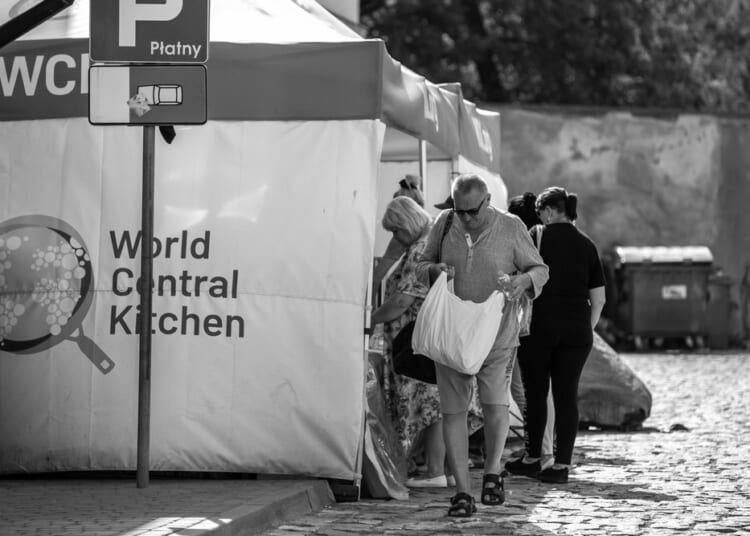FOLLOWING the Israeli Defence Force’s (IDF) unintentional strike on a humanitarian aid vehicle which killed seven World Central Kitchen (WCK) employees in Gaza, two senior officers have been dismissed, while a third will be reprimanded. The initial report into the incident stated that it ‘should not have occurred. Those who approved the strike were convinced they were targeting armed Hamas operatives’. It blames misidentification, wrong decisions and an attack contrary to Standard Operating Procedures.
The incident led to an unprecedented backlash against Israel. It should also have served as a reminder that any war zone is a highly dangerous place for combatants, aid workers, their security details and local populations alike. The United Nations’ highly controversial refugee agency in Gaza, UNRWA, claims https://www.npr.org/2024/04/05/1243163044/the-lives-of-other-aid-workers-killed-in-gaza over 200 aid workers have died in the last six months, the majority of them its own employees. How much their work is humanitarian and how much political is a moot point. Following the outbreak of the war in Gaza last year, the UN released $5million in just one week to people sheltering in Gaza and the West Bank. UNWRA’s critics say it is an enabler of the crisis and has a worrying relationship with Hamas and the Palestinian Authority and is itself an obstacle to peace.
The UN accounts for around 80 per cent of ‘aid’ into Gaza, but other global organisations are also active, including World Central Kitchen. According to the BBC, before the strike this group which few people had ever heard of were providing around 350,000 meals every day, with 400 Palestinian staff and a further 3,000 people working for it indirectly, via 68 community kitchens.
This ‘food relief’ NGO was founded in 2010 by Spanish-American chef José Andrés, a restaurant operator with a personal net worth of $50million. It provides ‘emergency food relief, culinary training, legacy programs and Ramadan efforts’, whatever they may be. It says it is funded mainly from contributions and grants and to a lesser sum by government contracts. It has quickly become a mainstay of American philanthropy, with contributions on par with much older organisations. In 2022 it reported $518million in total contributions and Andrés himself received $100million from Amazon founder Jeff Bezos in 2021. Its CEO Erin Gore earns over $208,000.
It has a very effective Just Giving site, but a great deal of its revenue stems from national and international aid budgets and grants – i.e. from the taxpayer.
But who exactly were those who forfeited their lives supplying aid to Gaza? Zomi Frankcom, an aid worker from Australia, was the organisation’s relief lead in Gaza. Damian Sobol, a Polish aid worker, had previously been active in Ukraine. Saifeddin Abutaha was their Palestinian driver. The others – three British and one Canadian-American – were all formerly active in the military. Jacob Flickinger had served 11 years in the Canadian Armed Forces. John Chapman, a former member of the UK special services, James Kirby, a former army sniper and Jim Henderson, a former Royal Marine, worked directly for the Dorset-based security firm Solace Global, contracted to ‘support’ WCK in Gaza. Henderson, who served six years in the Marines in Bosnia and Afghanistan, described himself as ‘highly disciplined’ and whose ‘true vocation lies in security’ in a civilian position.
Solace Global offers risk management services, including travel risk assessments and intelligence, global security software, in-country security, evacuation and repatriation, and NGO & high risk location support, with an annual turnover of $82million. Such security work by definition will be high-risk.
This enormous expansion in financing and manpower of the aid agencies has led to a concomitant industrial upgrade of their security from in-house co-volunteers to full-blown professionally trained and equipped experts, outsourced via specialist organisations. Jethro Norman, of ReliefWeb, has highlighted the resulting tensions between security managers and humanitarians as well as the risk of increasing security budgets for humanitarian operations: the paradox that in order better to protect the humanitarians going about their work, the agencies end up exposing them to even greater dangers.
Does such quasi-militarisation mean that the heightened risks faced by professional guards, as part and parcel of their contracts, are then transferred on to the volunteers themselves? Jamie Williamson, of the International Code of Conduct Association, has suggested that ‘aid agency security is a disaster waiting to happen’.
It just has – in the misidentification as armed Hamas operatives of an aid vehicle carrying an ill-fated mix of volunteers and security professionals.
Given the alleged involvement of UNWRA employees in terrorist activities, this becomes all the more pertinent. In January Israel presented a dossier containing allegations against 12 UNWRA employees, which led to more than a dozen countries suspending funds to the agency. While two of the 12 had already died the remaining ten were fired and an immediate investigation launched.
The IDF’s task of discriminating between Hamas combatants, aid workers and professional security detail is doubly fraught.
The strike against WCK was a human tragedy for the individuals targeted and their grieving families and employers. It has led to several key aid agencies including WCK to pause their operations altogether.
Both the aid agencies and their devolved security partners in Gaza need to demonstrate their independence from Hamas and impartiality about the war, and set out non-negotiable terms for their food delivery accordingly – terms that the IDF can trust. Otherwise international pressures on Israel will continue enabling Hamas to weaponise the suffering of Gazans even further.











